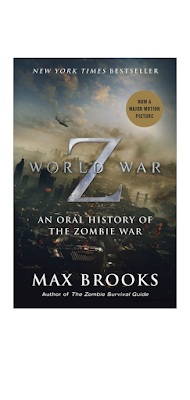A novel written by : Max Brooks
Published September 12, 2006
Page : 342
The story is told in the form of a series of interviews conducted by the narrator, Max Brooks, an agent of the United NationsPostwar Commission. Although the exact origin of the plague is unknown, a young boy from a village in Chongqing, China is identified as the plague's official patient zero. The plague spreads to various nations by human trafficking, refugees and the black market organ trade. Initially these nations are able to cover up their smaller outbreaks, until a much larger outbreak in South Africa brings the plague to public attention.
As the infection spreads, Israel abandons the Palestinian territories and initiates a nationwide cordon sanitaire, closing its borders to everyone except uninfected Jews and Palestinians. The United States does little to prepare because of its overconfidence in its ability to suppress any threat. Although special forces teams contain initial outbreaks, a widespread effort never starts: the nation is deprived of political will by "brushfire wars", and a widely distributed and marketed placebo vaccine, Phalanx, creates a false sense of security.
After a journalist reveals that Phalanx does nothing to prevent zombification, a period known as the "Great Panic" begins. Pakistan and Iran destroy each other in a nuclear warover Pakistani refugees entering Iran. After zombies overrun New York City, the U.S. military sets up a high-profile defense in the nearby city of Yonkers. The "Battle of Yonkers" is a disaster; modern weapons and tactics prove ineffective against zombies, which have no self-preservation instincts, feel no pain, and can only be stopped if shot through the head. The unprepared and demoralized soldiers are routed on live television. Other countries suffer similarly disastrous defeats, and human civilization teeters on the brink of collapse.
In South Africa, the government adopts a contingency plan drafted by apartheid-era intelligence consultant Paul Redeker, known as the Redeker Plan. It calls for the establishment of small sanctuaries, leaving large groups of survivors abandoned in special zones as human baits in order to distract the undead and allowing those within the main safe zone time to regroup and recuperate. Governments worldwide assume similar plans. As zombies freeze solid in extreme cold, many civilians in North America flee to the wildernesses of northern Canadaand the Arctic, where eleven million people die of starvation and hypothermia. Several astronauts stranded aboard the ISS witness the profound environmental impact as most of humanity resorts to burning wood and trash for warmth.
After the U.S. government relocates to Hawaii, the military abandons the eastern United States and establishes safe zones west of the Rocky Mountains. All aspects of civilian life are devoted to supporting the war effort; people with skills such as carpentry and construction find themselves more valuable than people with managerial skills.
Seven years after the outbreak began, a conference is held off the coast of Honolulu, aboard the decommissioned USS Saratoga, where the new United Nations headquarters are located. Most of the world's leaders argue that they can outlast the zombie plague if they stay in their safe zones while the zombies rot away. However, the U.S. president argues for going on the offensive. Determined to lead by example, the U.S. military reinvents itself to meet the specific strategic requirements of fighting the undead. Backed by a resurgent U.S. wartime economy, the military begins the three-year-long process of retaking the contiguous United States from both the undead swarms and groups of hostile human survivors. Encouraged by America's success in defeating the zombies, many countries start to retake infested areas.
Ten years after the official end of the zombie war, millions of zombies are still active, mainly on the ocean floor or on snow line islands. The United Nations fields a large military force to eliminate them. Cuba has become a democracy and hosts the world's most thriving economy. Tibet is freed from Chinese rule, which in turn becomes a democracy as well, and hosts Lhasa as the world's most populated city. Following a religious revolution, Russia is now an expansionist theocracy and adopts a repopulation programme. North Korea is completely empty, with the entire population presumed to have disappeared into underground bunkers or been wiped out in the outbreak. Iceland has been depopulated and remains the world's most heavily infested country.



👌👌👌
ReplyDelete